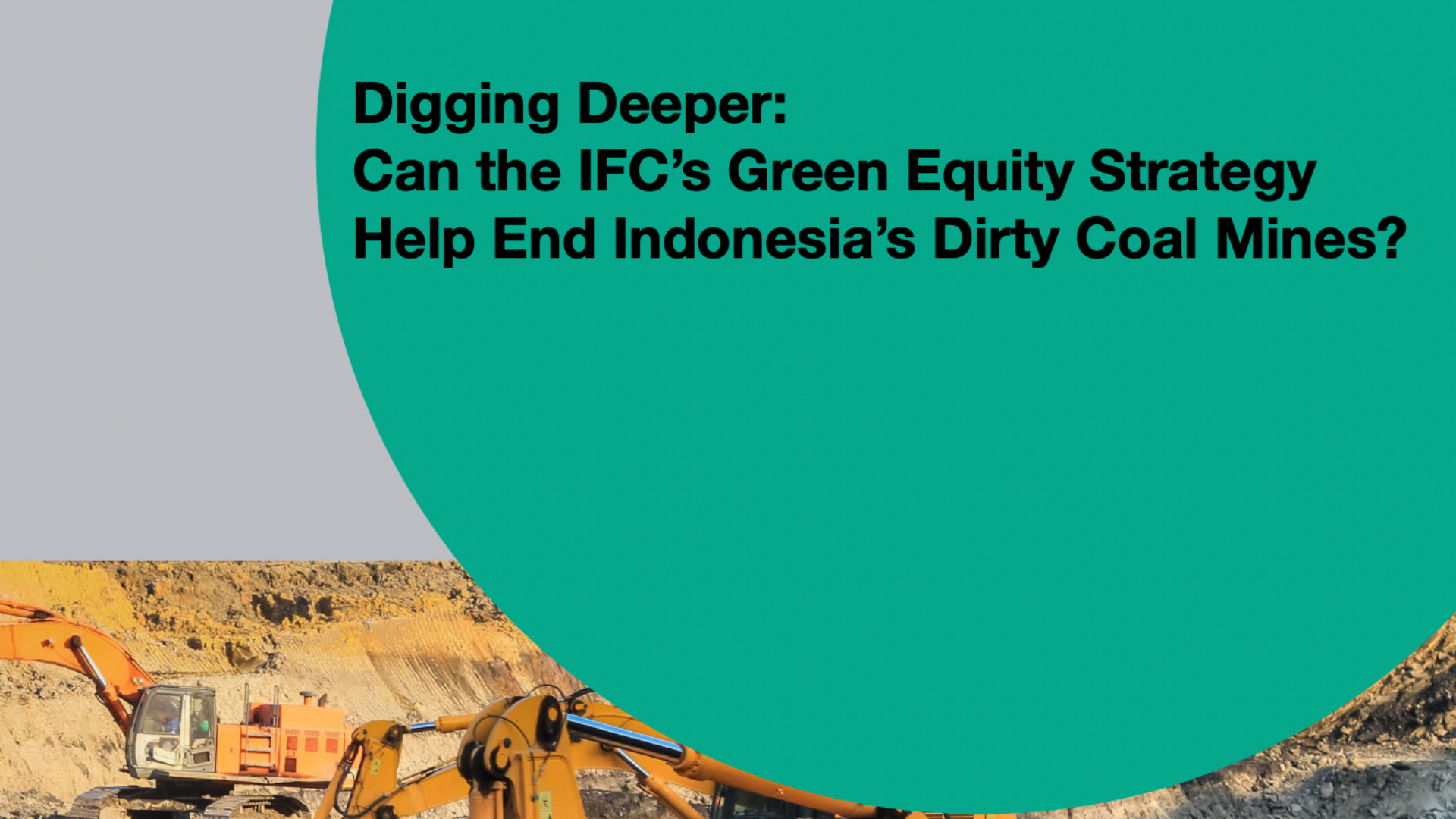- 11.04.2019
For immediate release
New report exposes World Bank links to destructive coal mining in Indonesia
Can the IFC’s new Green Equity Strategy clean up the bank’s coal problem?
(April 11, 2019, Washington DC) – The World Bank Group is quietly bankrolling some of Indonesia’s most destructive coal mining companies, despite instituting a virtual ban on coal financing in 2013, according to a report released today by Inclusive Development International, Bank Information Center Europe and JATAM Indonesia.
The International Finance Corporation (IFC), the World Bank’s private-sector arm, has in recent years provided hundreds of millions of dollars to client banks and private equity funds that have on-lent the money with limited oversight in Indonesia, including to the country’s largest coal producer, Bumi Resources, and other major players in the industry.
Coal mining has devastated large parts of Indonesia, the world’s second-largest coal exporter. It has decimated the archipelago’s globally important rainforests and biodiversity, threatened the country’s food security, and displaced thousands of indigenous people from their homes and land. The impacts have been particularly severe in Borneo, Asia’s most biodiverse island.
The findings are part of an ongoing investigation into the IFC’s sprawling and opaque financial-sector portfolio, worth some $6.4 billion in 2018 alone. While the World Bank Group member has historically provided direct financing for private-sector projects, it has increasingly outsourced its budget to commercial banks, private equity funds and insurance companies. This new model of development finance has exposed the IFC to a range of harmful corporate activities that conflict with the World Bank’s mission to fight poverty through sustainable development.
The investigation of the IFC’s financial-sector portfolio, led by Inclusive Development International and Bank Information Center Europe, has uncovered hidden financial flows to more than 150 companies and projects around the world that have violated human rights, damaged the environment and accelerated climate change, in violation of the IFC’s social and environmental Performance Standards. The organizations have been releasing the results of the investigation, which began in 2016, in a series of reports and a comprehensive database.
More than half of the 150 projects uncovered involve coal. In response to these findings, the IFC recently unveiled a draft plan, called the Green Equity Strategy, designed to move its client banks away from financing coal and toward renewable energy. In addition, the IFC says it increasingly requires its financial-sector clients to direct its money toward specific development purposes such as small business loans, an approach known as “ring fencing.” Such ring fences effectively exclude coal, the IFC contends.
“The IFC is taking welcome steps to address the harms in its financial-sector portfolio, including pledging to reduce coal exposure to zero and help its clients step away from coal. The IFC influences over $4.5 trillion of investments in emerging markets, so these moves signal the beginning of the end for coal. But the devil is in the details, and we will be watching closely for any loopholes which allow this dirty financing to continue,” said Kate Geary, Co-Director of Bank Information Center Europe.
Inclusive Development International and Bank Information Center Europe are urging the IFC to speed up the Green Equity Strategy’s timeline of targets and extend restrictions to other fossil fuels to make the strategy commensurate with the severity of the climate crisis. They are also calling on the IFC to be more transparent, rigorous and accountable in its ring fencing of financial-sector investments.
“Money is fungible so if the IFC doesn’t put strict measures in place to ensure that its funds are actually being used to achieve a positive development impact, then banks will continue to go about their business as usual while reaping the benefits of the World Bank’s green stamp of approval,” said David Pred, Executive Director of Inclusive Development International. “The taxpayers who fund the World Bank need to be given much more assurance that this isn’t just a bunch of smoke and mirrors,” he added.
The report looks in particular at the impacts of the Kaltim Prima Coal company, which operates a 90,000-hectare strip mining operation in East Kalimantan, a province in Indonesian Borneo. The project has displaced members of the indigenous Dayak Basap people and damaged their livelihoods, water sources and food security. The IFC is exposed to the mining project through two financial-sector clients, Raiffeisen Bank International of Austria and Axis Bank of India. The IFC also directly financed the mine’s largest customer, the 4-gigawatt Mundra coal plant in India.
The authors also call on the IFC to address the harm caused by these projects in Indonesia, which the new coal commitments are unlikely to remedy.
“The World Bank’s money has funded the destruction of an entire indigenous people’s way of life,” said Merah Johansyah, the head of the Jakarta-based coal watchdog JATAM. “It helped create this mess, so it has a responsibility to help fix it.”
The report can be downloaded here.
For more information please contact:
In Washington DC:
– Dustin Roasa, Inclusive Development International (report author): tel: +1 828-458-0312 email: dustin@inclusivedevelopment.net
– David Pred, Executive Director of Inclusive Development International: tel: +1 917-2802705, email: david@inclusivedevelopment.net
– Kate Geary, Co-Director of BIC Europe: tel: +44 7393189175 email: kate@bic-europe.org
In Jakarta:
– Merah Johansyah, JATAM: tel: +62 813-4788-2228 email: merahjohansyah@gmail.com

